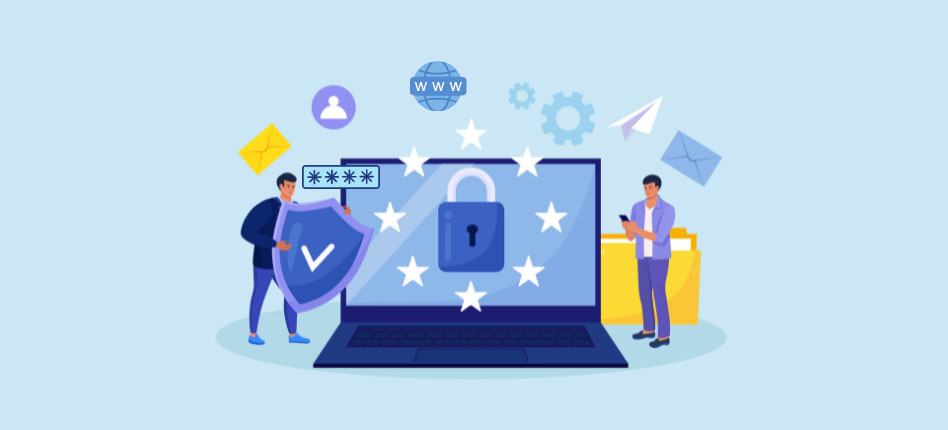Now that you’ve finished checking on everything your website needs before launching, it’s time to protect it before releasing it to the public! You’ve worked hard as a small company owner to establish your website and have gone to great efforts to ensure that everything works correctly. That is why, just as you protect your identity and credit cards, you must ensure the security of your small company website.

What Exactly Is Website Security?
When we say “secure,” what exactly do we mean? For the sake of this discussion, we’ll stick with what Google Developers use to describe a safe site:
- Authentication: Your users are communicating with the intended website
- Data integrity: Your data cannot be purposefully or unintentionally changed or altered during transmission without being recognized.
- Encryption: While users are browning, no third parties can track their activities across multiple pages or steal information.
FURTHER READING: |
| 1. Build eCommerce Site From Scratch by Opencart Framework |
| 2. Why Is My Website Running Slow? |
| 3. Bandwidth Usage: What It Means and How to Check Bandwidth Usage on Routers |
How Do Websites Get Hacked and What Does a Hacked Website Look Like?
Before we go into how to safeguard your website, let’s take a look at why websites are targeted by hackers. Because hackers are growing increasingly complex, there is no definitive evidence of a compromised website. In reality, certain aftermaths of a hacked website are not evident at all! Here’s a basic rundown of the numerous website hacking techniques:
1. Ransomware
Ransomware is a sort of virus that uses encryption to keep a victim’s data hostage. The vital data of a person or company is encrypted so that they cannot access files, databases, or apps. A ransom is then required to get access. Ransomware is often intended to propagate over a network and target database and file servers, thereby paralyzing an entire enterprise. In summary, if your data comes into the hands of hackers, they will threaten to prevent your access to it or, worse, expose it for everyone to see until you pay them a ransom.
2. Phishing
Phishing is a kind of social engineering attack that is often used to acquire user information such as login passwords and credit card details. It happens when a hacker or fraudster poses as a member of your company and tricks victims into opening an email, instant chat, or text message from you. When victims read these communications, they are often enticed to click on dangerous links. These URLs may lead to a malware installation, system freezes as part of a ransomware assault, or the disclosure of sensitive information.
3. Your clients, as end-users
They are often the victims of phishing assaults. This implies that your organization and brand may lose credibility and trust over time.
4. Distributed Denial of service (DDoS)
DDoS is an abbreviation for distributed denial-of-service. DDoS attacks are efforts to disrupt internet services by flooding them with traffic. Large enterprises, such as banks and media outlets, are the most popular targets for DDoS assaults. However, in recent years, it has become increasingly usual for smaller firms to wonder how to halt a DDoS assault.
5. Other types of website hacks
There are several additional methods that hackers may employ to crash your website or compromise your data. Malicious programs or viruses come in a variety of shapes and sizes, and hackers will find methods to incorporate them into your website. When this occurs, your website may become unavailable, entirely crash, or worse, the data on your website may be made exposed to these hackers. Hardware may potentially be impacted.
5 Ways to Secure Your Site
1. Install an SSL certificate on your website and use HTTPS protocol
- Have you ever seen the lock icon before the website domain on the left side of your browser bar? This symbol denotes that the URL starts with “HTTPS.” This abbreviation stands for Hypertext Transfer Protocol Secure.
- Hover your mouse over the lock symbol, and depending on your browser, it will say something like “Connection is secure. When you provide information to our site (such as passwords or payment card details), it is kept private.”
- When a website is protected with an SSL (Secure Sockets Layer) certificate, HTTPS (Hyper Text Transfer Protocol Secure) appears in the URL. To protect your website and build customer confidence in your business, you must get an SSL certificate.
- Aside from security, having an SSL certificate is essential for your website to rank effectively in Google search results. This ensures that your website can be found.
2. Use secure passwords and change these regularly
Do you use the same password for all of your accounts, from social media to email to credit cards? While this makes it easy to remember your password, it puts your security in danger.
- Each account needs a unique password. Randomize passwords. Avoid passwords that contain your birthdate, name, or address. Offline or on a different device, you may save the password.
- To minimize the pain, consider using a password manager, especially if you are running a business website. Not only are a majority of them free, but they’re convenient and safe to use
3. Keep your software and plugins up to date
Just like your PC and smartphone, you must often perform website software upgrades to keep everything working. The same is true for your website.
Make it a habit to schedule regular or auto updates of your website and the installed plug-ins. Additionally, you should also keep your antivirus software up to date
4. Use security software or security plugins
Securing your website also implies that you have a mechanism in place to identify possible threats and attack attempts on a continuous basis. You may do this by installing anti-malware software on your website.
There are free plans available from major security software companies. You can also pay for good anti-malware software, depending on the levels of protection that you need for your website and your budget. The best anti-malware would conduct regular web scanning, malware detection, and removal, ensuring PCI compliance and DDoS protection.
5. back up your website regularly
In the case that your website’s security is breached, make sure you back up everything. How often should your website be backed up? This is comparable to how often you back up certain applications on your phone. The answer is determined by how often you change the contents of your website. Backing up at least monthly is excellent if you run a daily blog, for example.
Leverage 1Byte’s strong cloud computing expertise to boost your business in a big way
1Byte provides complete domain registration services that include dedicated support staff, educated customer care, reasonable costs, as well as a domain price search tool.
Elevate your online security with 1Byte's SSL Service. Unparalleled protection, seamless integration, and peace of mind for your digital journey.
No matter the cloud server package you pick, you can rely on 1Byte for dependability, privacy, security, and a stress-free experience that is essential for successful businesses.
Choosing us as your shared hosting provider allows you to get excellent value for your money while enjoying the same level of quality and functionality as more expensive options.
Through highly flexible programs, 1Byte's cutting-edge cloud hosting gives great solutions to small and medium-sized businesses faster, more securely, and at reduced costs.
Stay ahead of the competition with 1Byte's innovative WordPress hosting services. Our feature-rich plans and unmatched reliability ensure your website stands out and delivers an unforgettable user experience.
As an official AWS Partner, one of our primary responsibilities is to assist businesses in modernizing their operations and make the most of their journeys to the cloud with AWS.
Conclusions
As a website owner, you likely have to be concerned with several facets of maintaining a digital presence. From user experience to safe payments, an online presence demands continual upkeep.
Website security is a crucial component that you must guarantee your website has. The glad tidings? There are several plug-and-play options available, particularly if your website is modest.
Are you ready to go forward? Here, you may begin the process of registering a domain name and web hosting service at 1Byte now!

